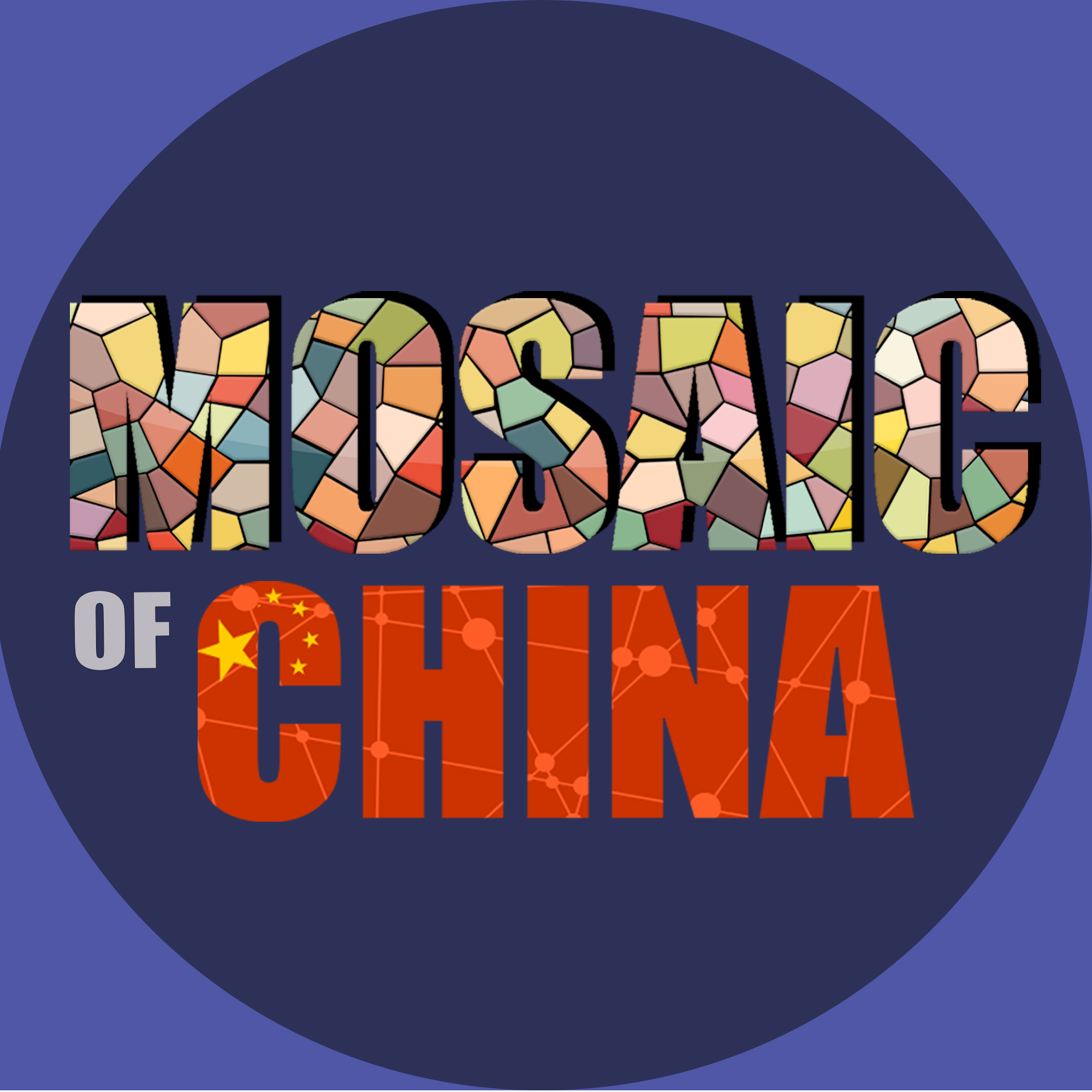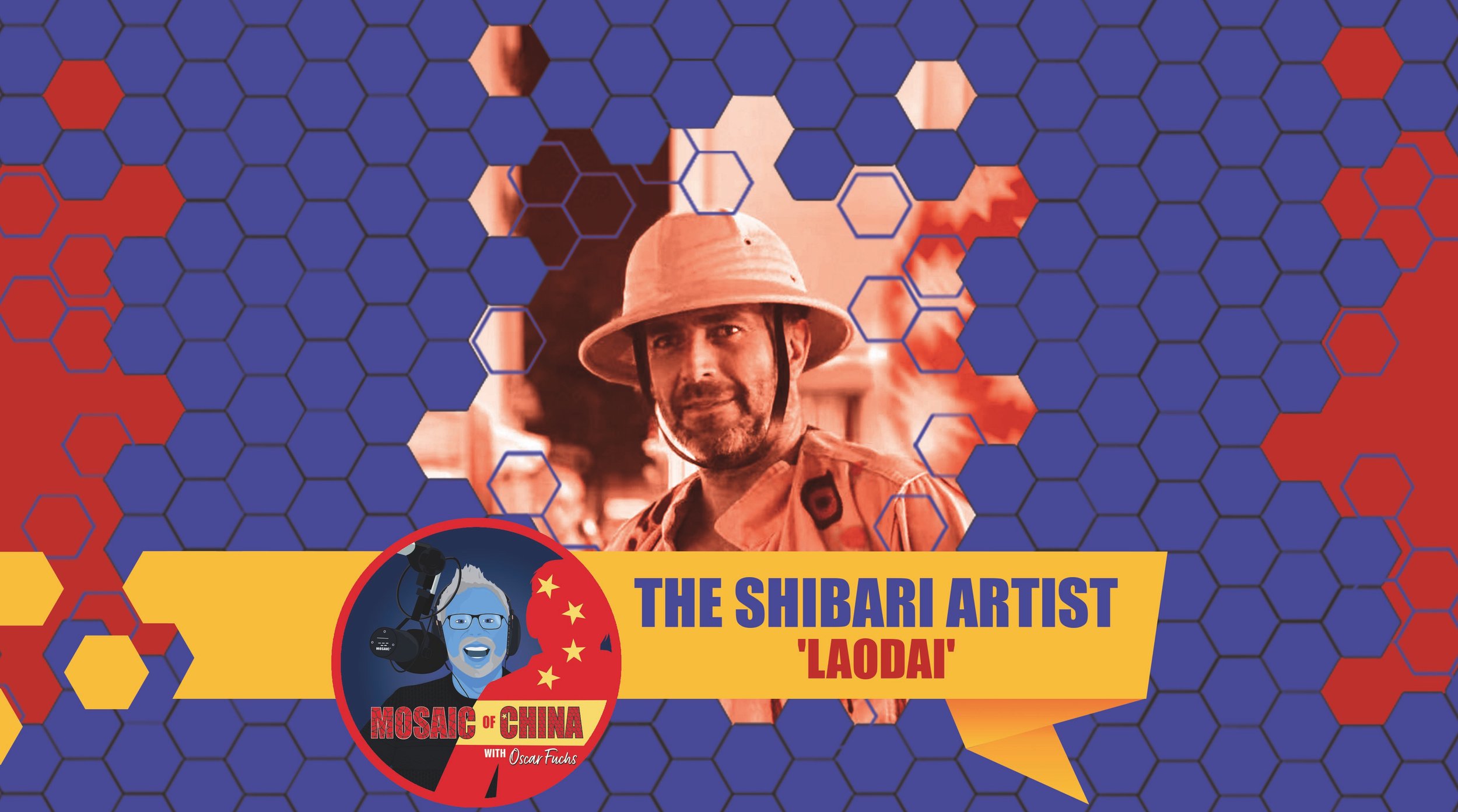Season 03 Episode 09
The details below are for the REGULAR version of this episode. For the PREMIUM version, subscribe on Apple Podcasts, Patreon (outside China) or 爱发电 (in China).
Episode 09: The Shibari Artist
'LAODAI' - Professional Shibari Rigger
Original Date of Release: 08 Nov 2022.
Sometimes big themes can be tackled through the guise of performance art. In previous episodes of the podcast, we have explored how drag performers can teach us to embrace our own weirdness, and how clowns can teach us to embrace our own fallibility. These stories may be specific to China, but they apply to us all.
In today’s very special episode, we explore how the world of Shibari (縛り) has made its way from the world of BDSM to the world of Rope Art, and also made its way from Japan to China. And we discover how this art form can make us think about the themes of communication, connection and consent.
The episode also includes a catch-up interview with YANG Yi from Season 01 Episode 21.
Season 03 is supported by Shanghai Daily - the China news site; Rosetta Stone - the language learning company; naked Retreats - the luxury resorts company; SmartShanghai - the listings and classifieds app; and JustPod - the podcast production company.
To Join the Conversation and Follow The Graphics…
View the Instagram Story Highlight, the LinkedIn Post or the Facebook Album for this episode. Alternatively, follow Mosaic of China on WeChat.
To view the images below on a mobile device, rotate to landscape orientation to see the full image descriptions.
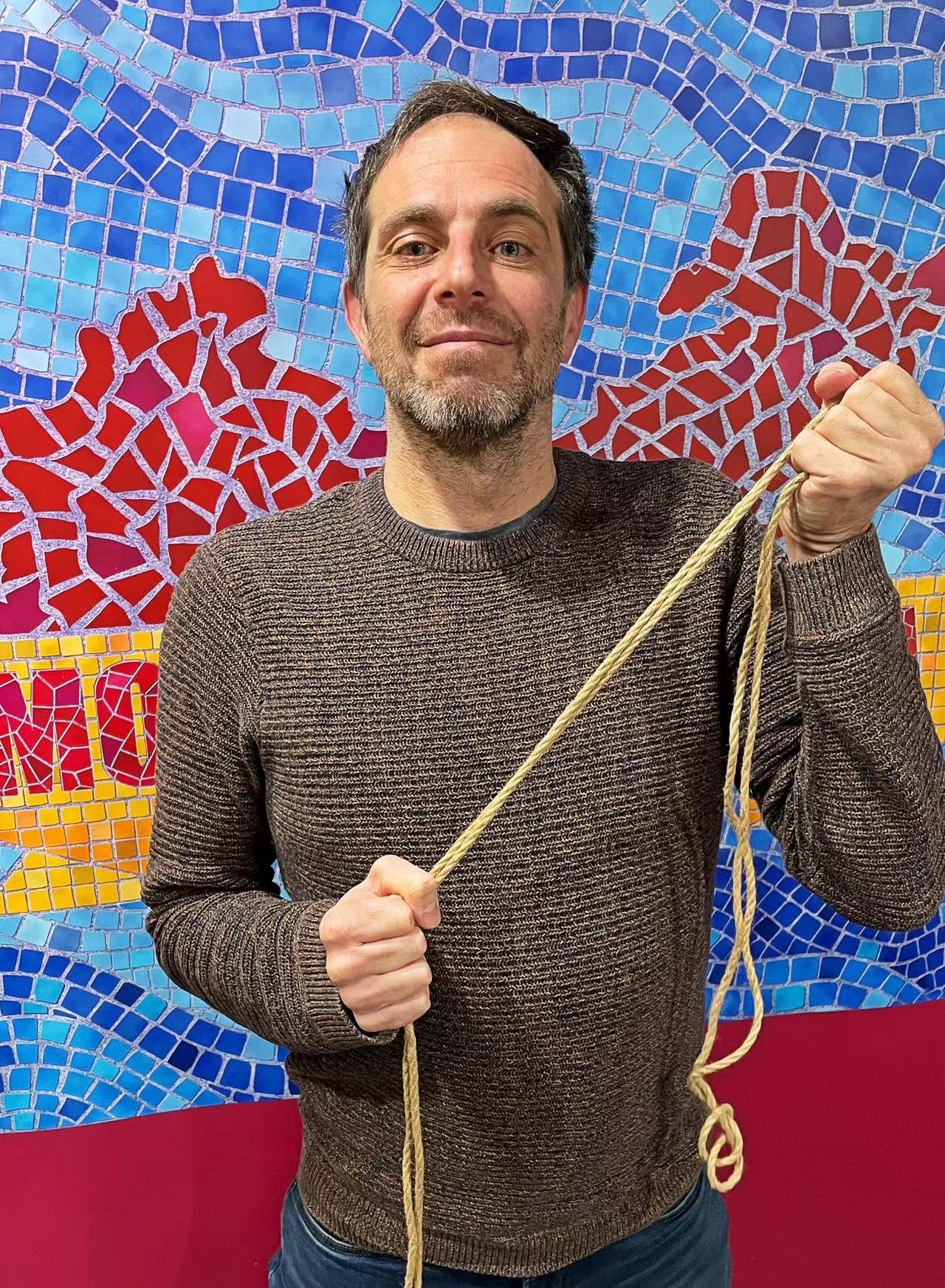

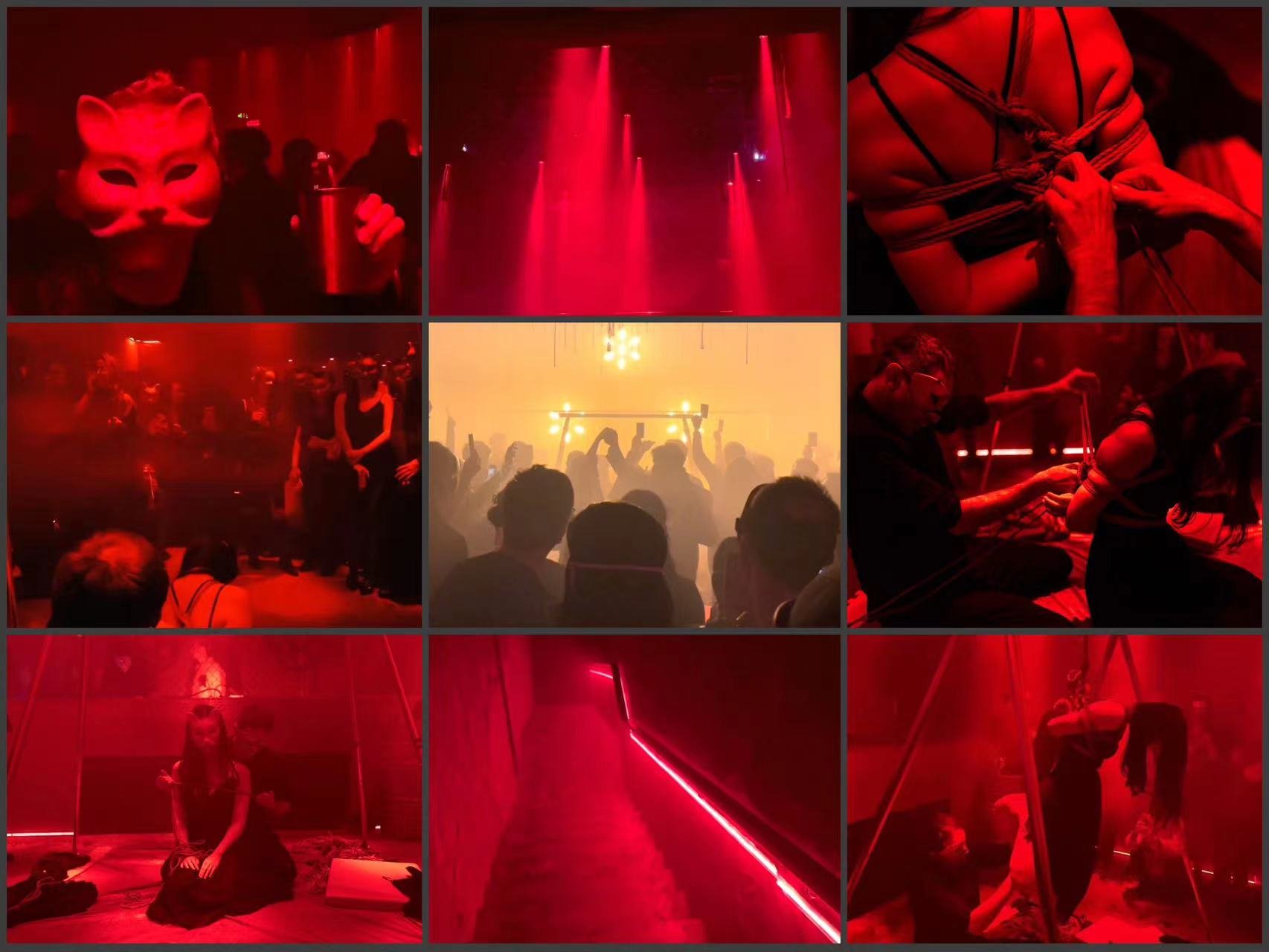
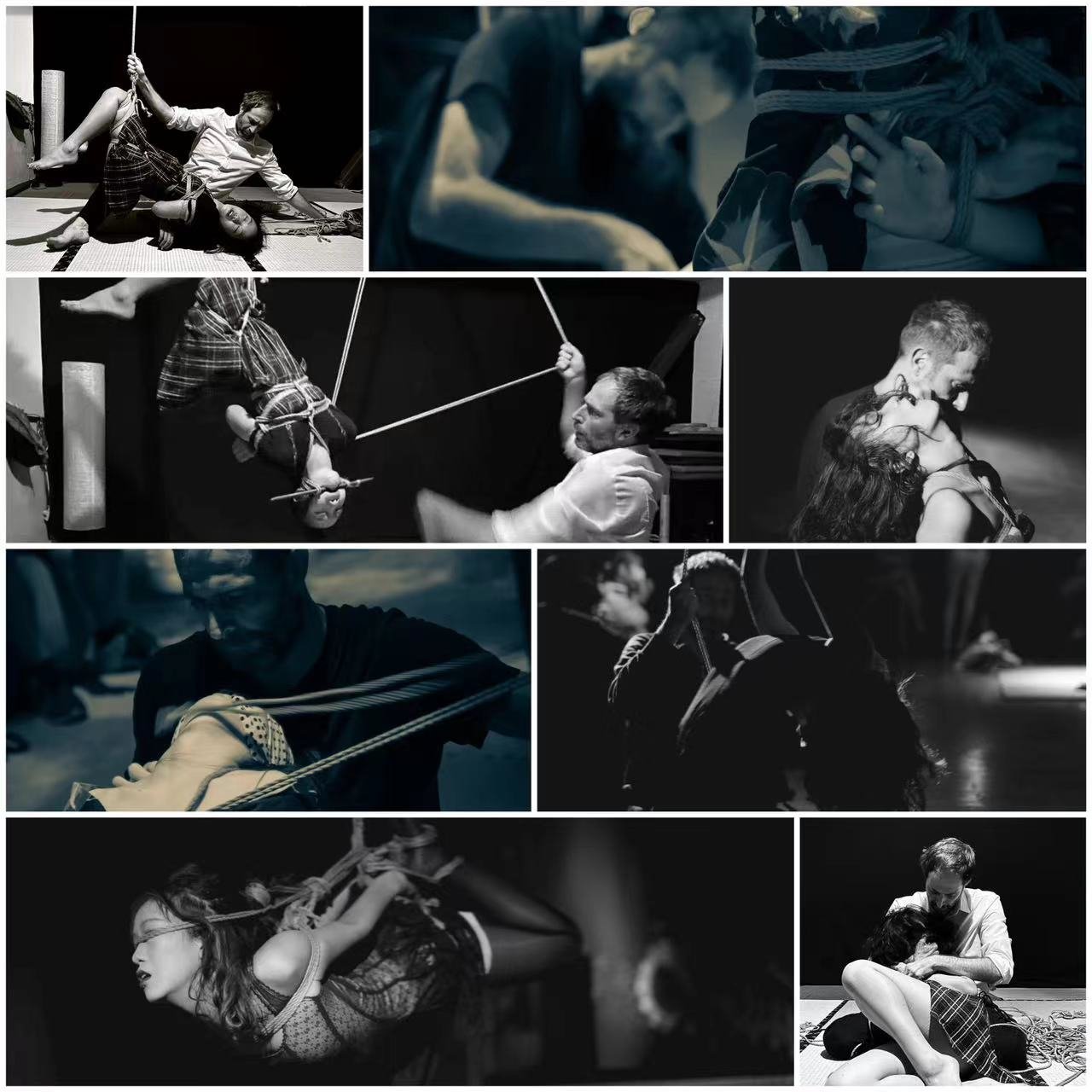
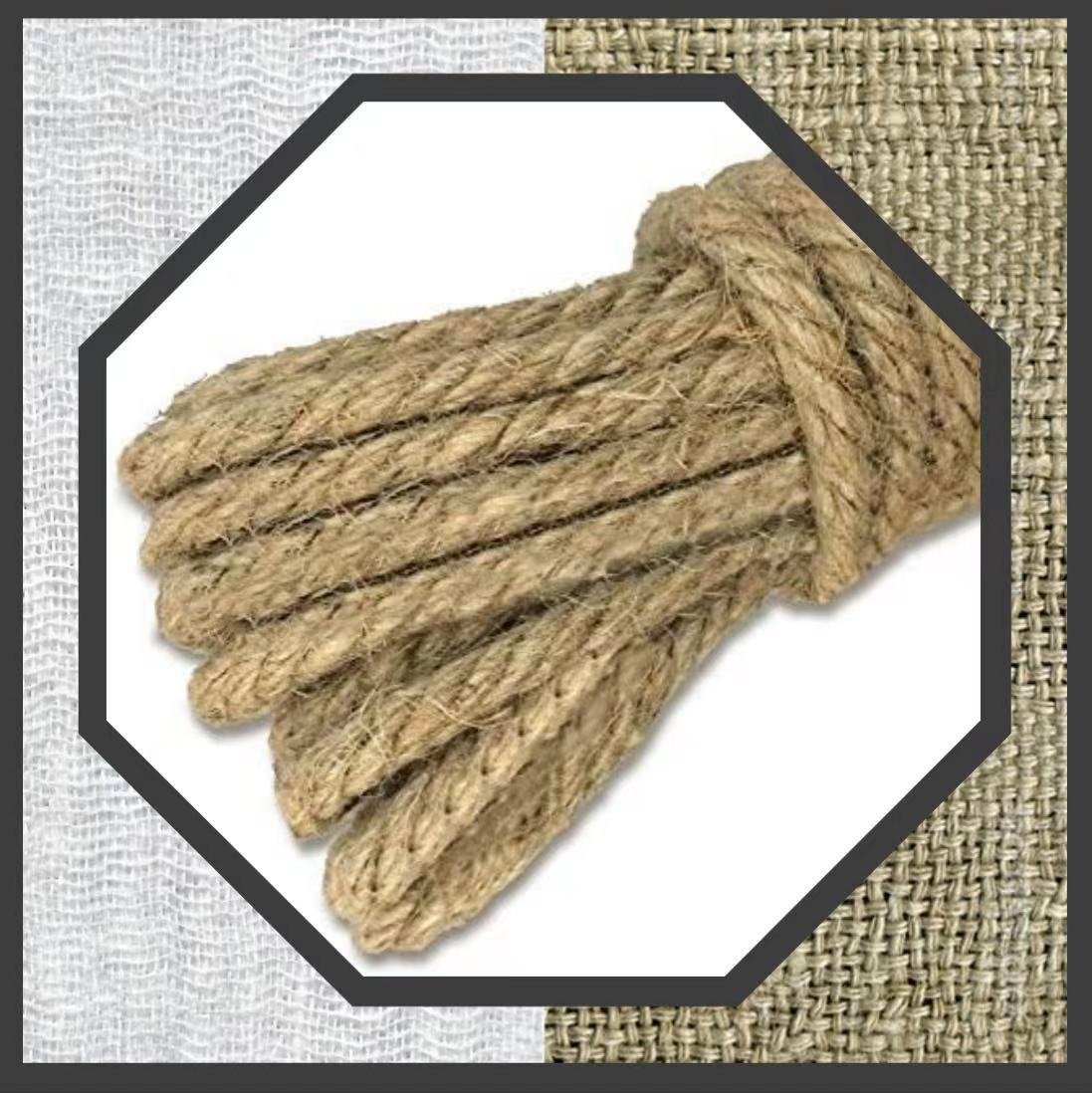
![Laodai: Put simply, his personal definition of the art of 縛り [shibari] is two people playing with ropes in an emotional way.](https://images.squarespace-cdn.com/content/v1/5d40122274f3720001d9543b/1667619053532-K53A7XLA70B4Y4X7YFN6/CN+11359+s03e09+%27LAODAI%27+D+General+Episode+Image.jpg)
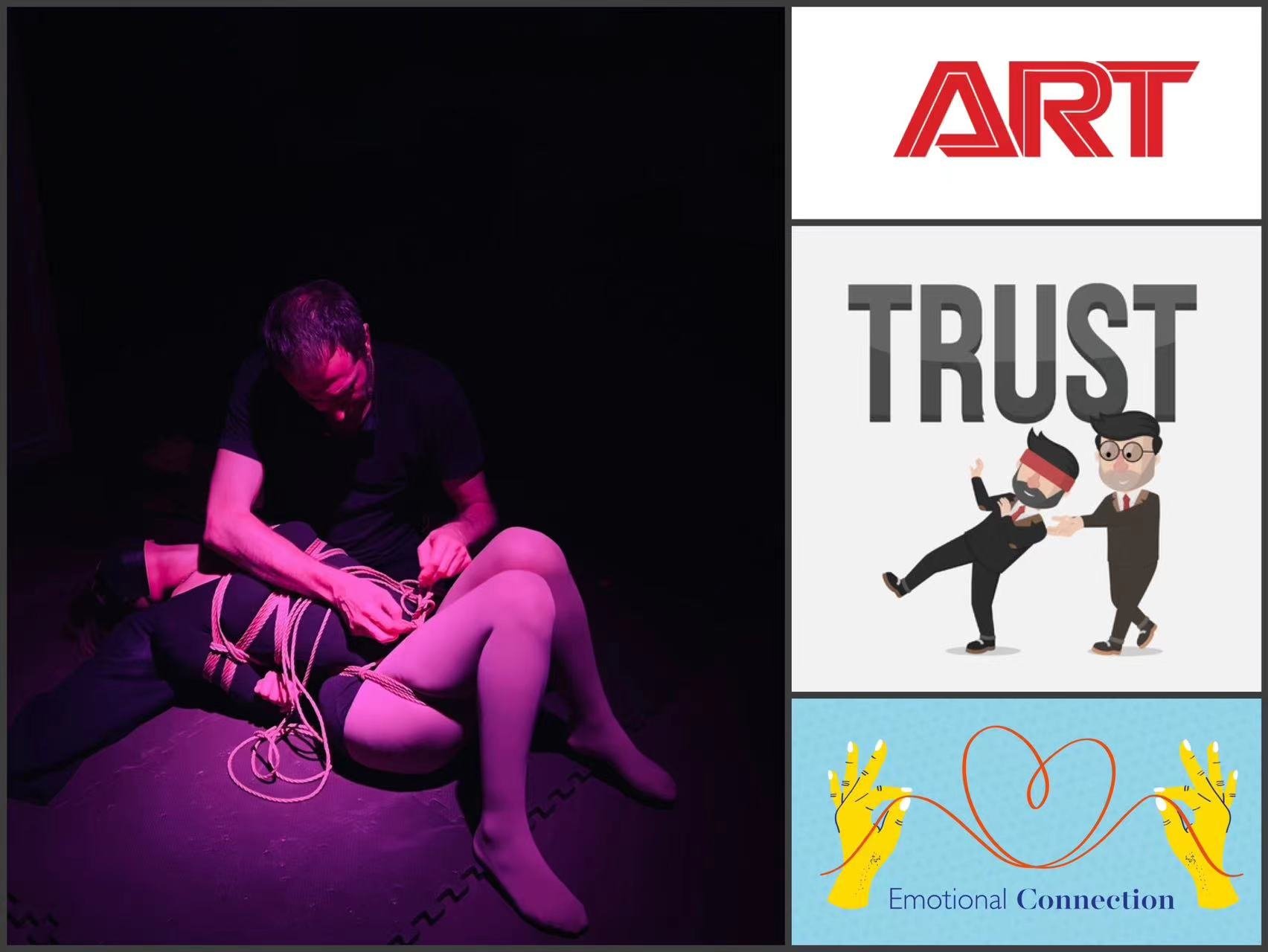
![Laodai: He first discovered this art at an exhibition of the work of 荒木經惟 [Araki Nobuyoshi].](https://images.squarespace-cdn.com/content/v1/5d40122274f3720001d9543b/1667619054928-JZCTHCGGNEAR8VRZWFAW/CN+11361+s03e09+%27LAODAI%27+D+General+Episode+Image.jpg)
![Laodai: You can practice 縛り [shibari] on mannequins, but there's a big difference when comparing rope tension against skin as against plastic.](https://images.squarespace-cdn.com/content/v1/5d40122274f3720001d9543b/1667619055722-JFG2LLOHB9IN9JL2RC4X/CN+11362+s03e09+%27LAODAI%27+D+General+Episode+Image.jpg)
![Laodai: There are two roles in 縛り [shibari], a ‘rigger’ who ties and a ‘model’ who is tied.](https://images.squarespace-cdn.com/content/v1/5d40122274f3720001d9543b/1667619056269-1V6K2MC3ZL0HWQZ14SD7/CN+11363+s03e09+%27LAODAI%27+D+General+Episode+Image.jpg)
![Laodai: You can draw parallels between 縛り [shibari] and other types of artistic performance that convey a level of emotion and sensuality between the performers.](https://images.squarespace-cdn.com/content/v1/5d40122274f3720001d9543b/1667619057265-DIU38DRKSEQHHFX13TYK/CN+11364+s03e09+%27LAODAI%27+D+General+Episode+Image.jpg)
![Laodai: The biggest potential for injury in 縛り [shibari] is nerve damage to the arms.](https://images.squarespace-cdn.com/content/v1/5d40122274f3720001d9543b/1667619057521-AIQZAUI3XSCH9CKRZWJH/CN+11365+s03e09+%27LAODAI%27+D+General+Episode+Image.jpg)

![Laodai: The key to practicing 縛り [shibari] in China - or anywhere else - is simply keeping it legal.](https://images.squarespace-cdn.com/content/v1/5d40122274f3720001d9543b/1667619058795-V4VY95GIZRS3QV9ZTLGJ/CN+11367+s03e09+%27LAODAI%27+D+General+Episode+Image.jpg)
![Laodai: You can see a certain cross-over between 縛り [shibari] workshops and aerial yoga.](https://images.squarespace-cdn.com/content/v1/5d40122274f3720001d9543b/1667619059711-ANK5VNO4P16SW23FXFFY/CN+11368+s03e09+%27LAODAI%27+D+General+Episode+Image.jpg)
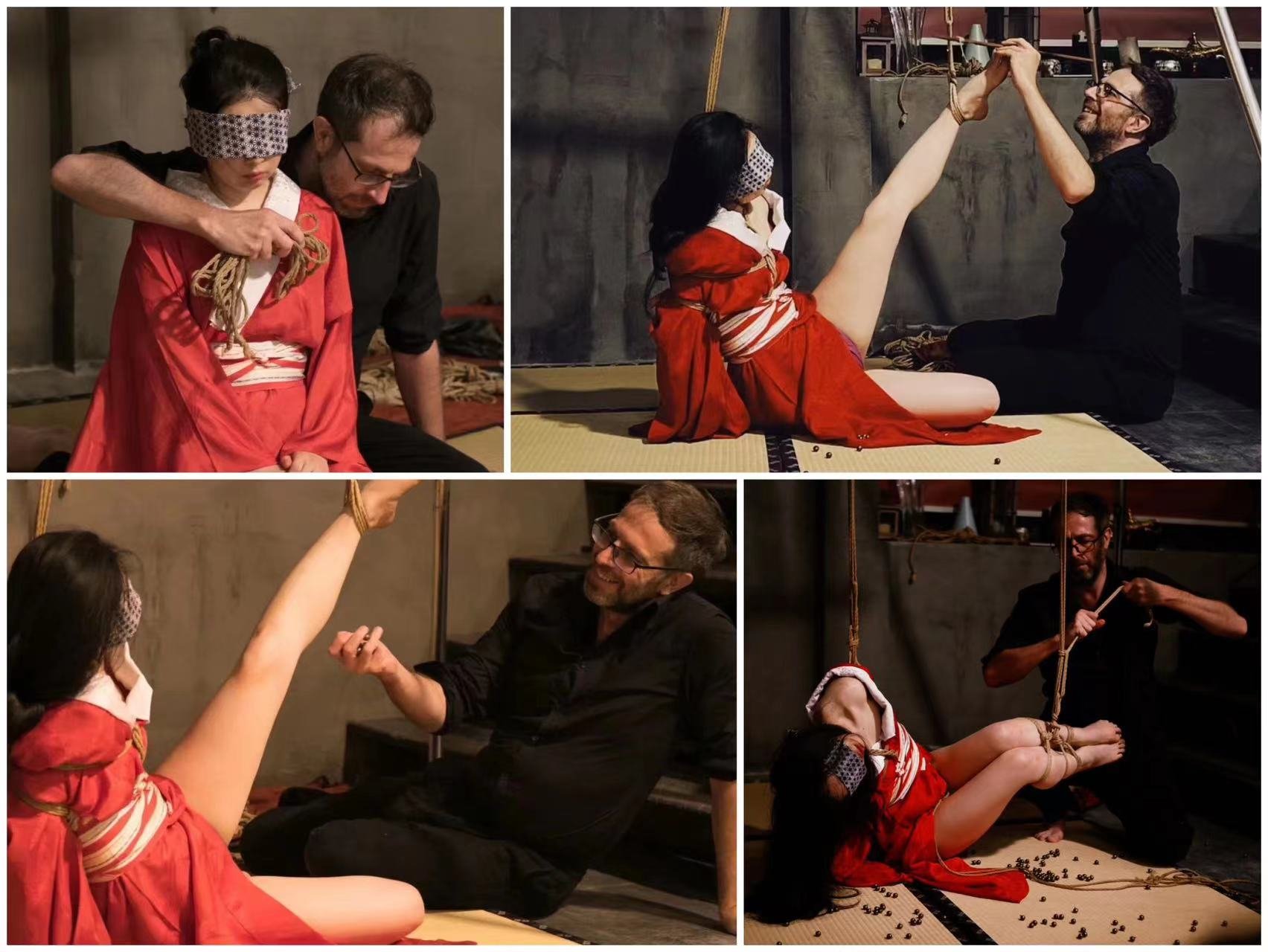
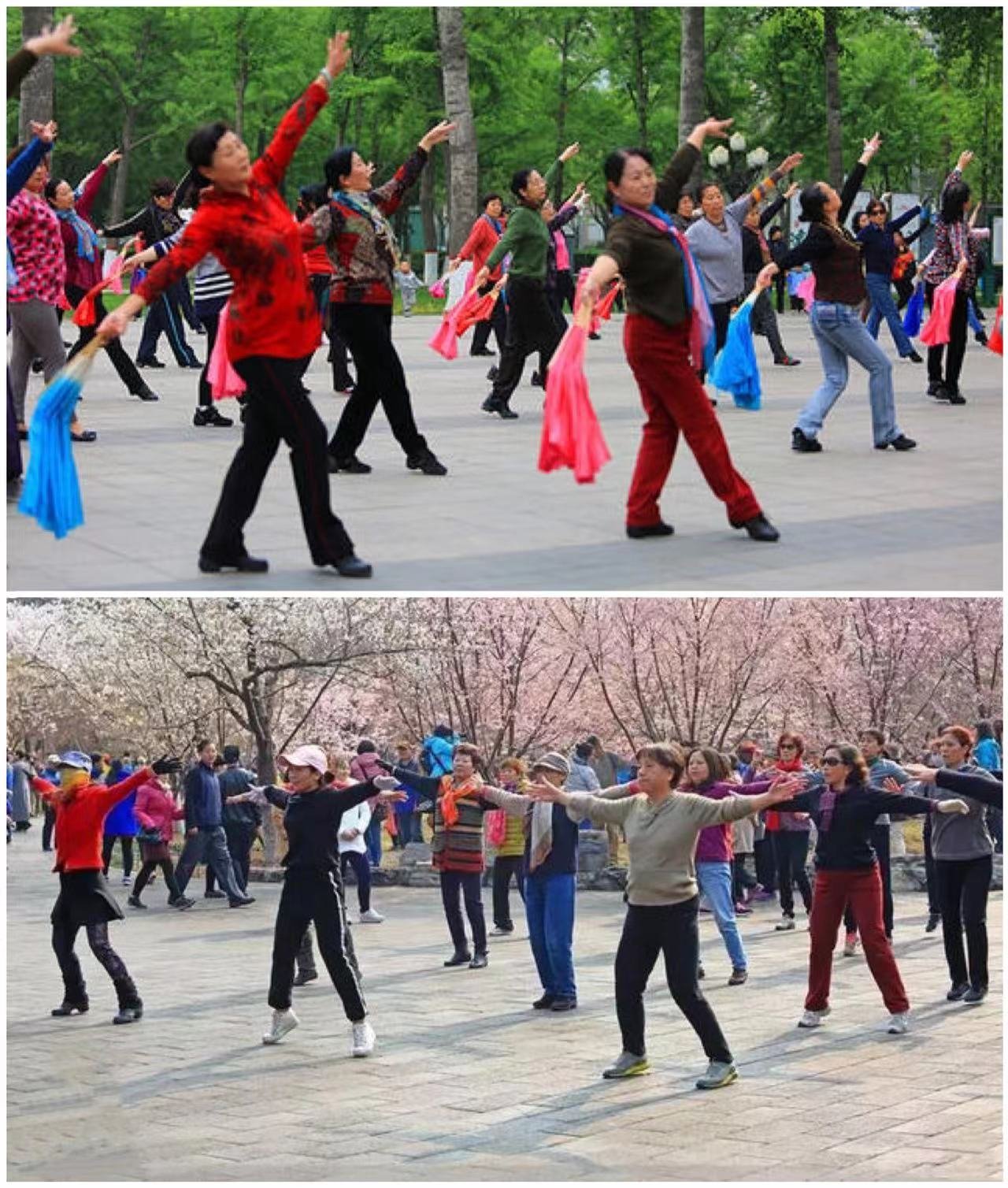
![Laodai's favourite phrase in Chinese: 不客气 [bùkèqì], because it sounds like the Italian word ‘boccuccia’ which roughly means 'kissy lips'.](https://images.squarespace-cdn.com/content/v1/5d40122274f3720001d9543b/1667619061838-H6EM496CNXNN0D4JC6R7/CN+11372+s03e09+%27LAODAI%27+F+Q02a+Phrase.jpg)
![Laodai's favourite destination in China: 张家界 [Zhāngjiājiè], which was one of the inspirations behind the film Avatar.](https://images.squarespace-cdn.com/content/v1/5d40122274f3720001d9543b/1667619062939-Z4KWKKG1CGMCBKCTQXYO/CN+11373+s03e09+%27LAODAI%27+G+Q03a+Destination.jpg)


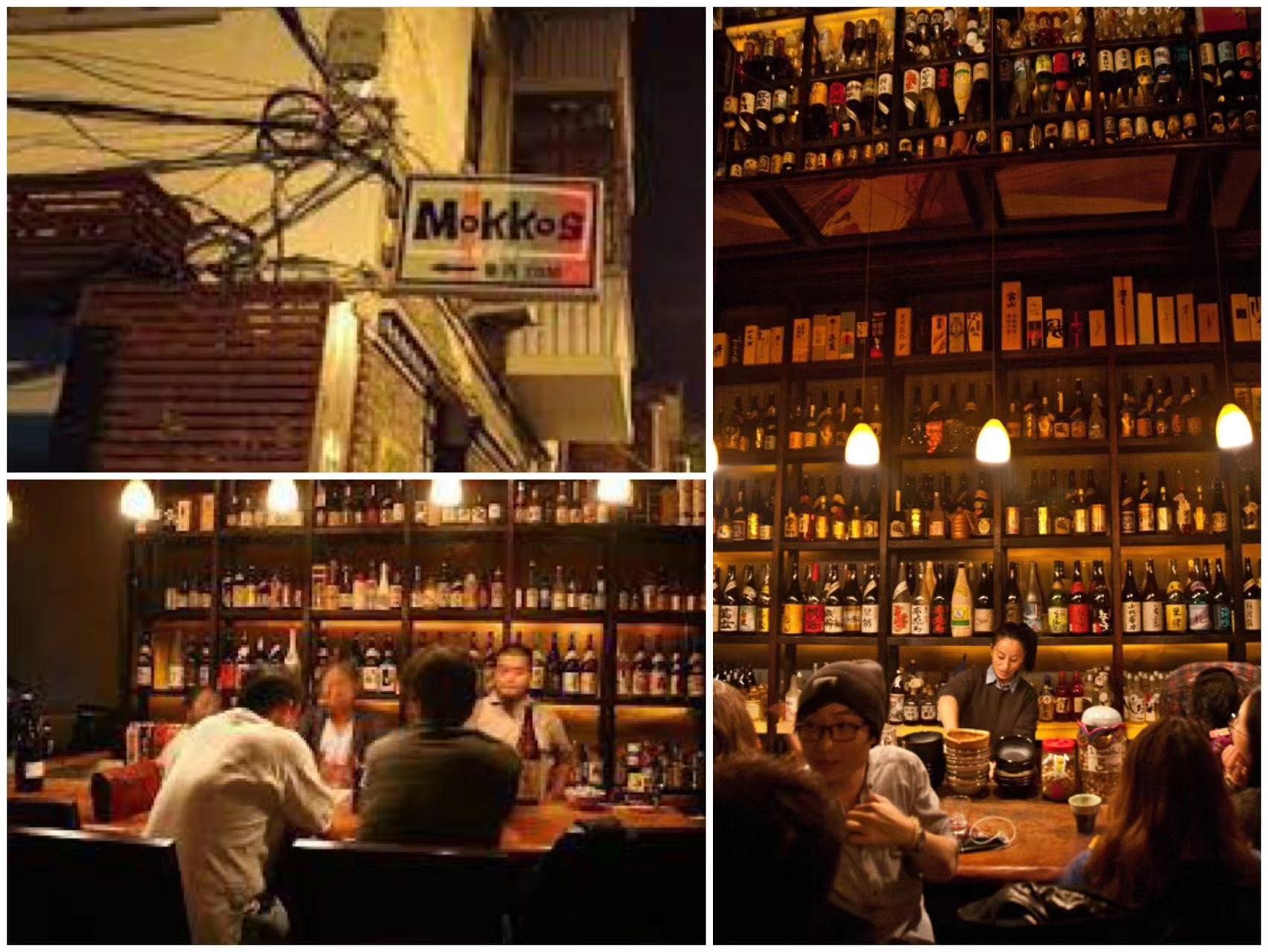

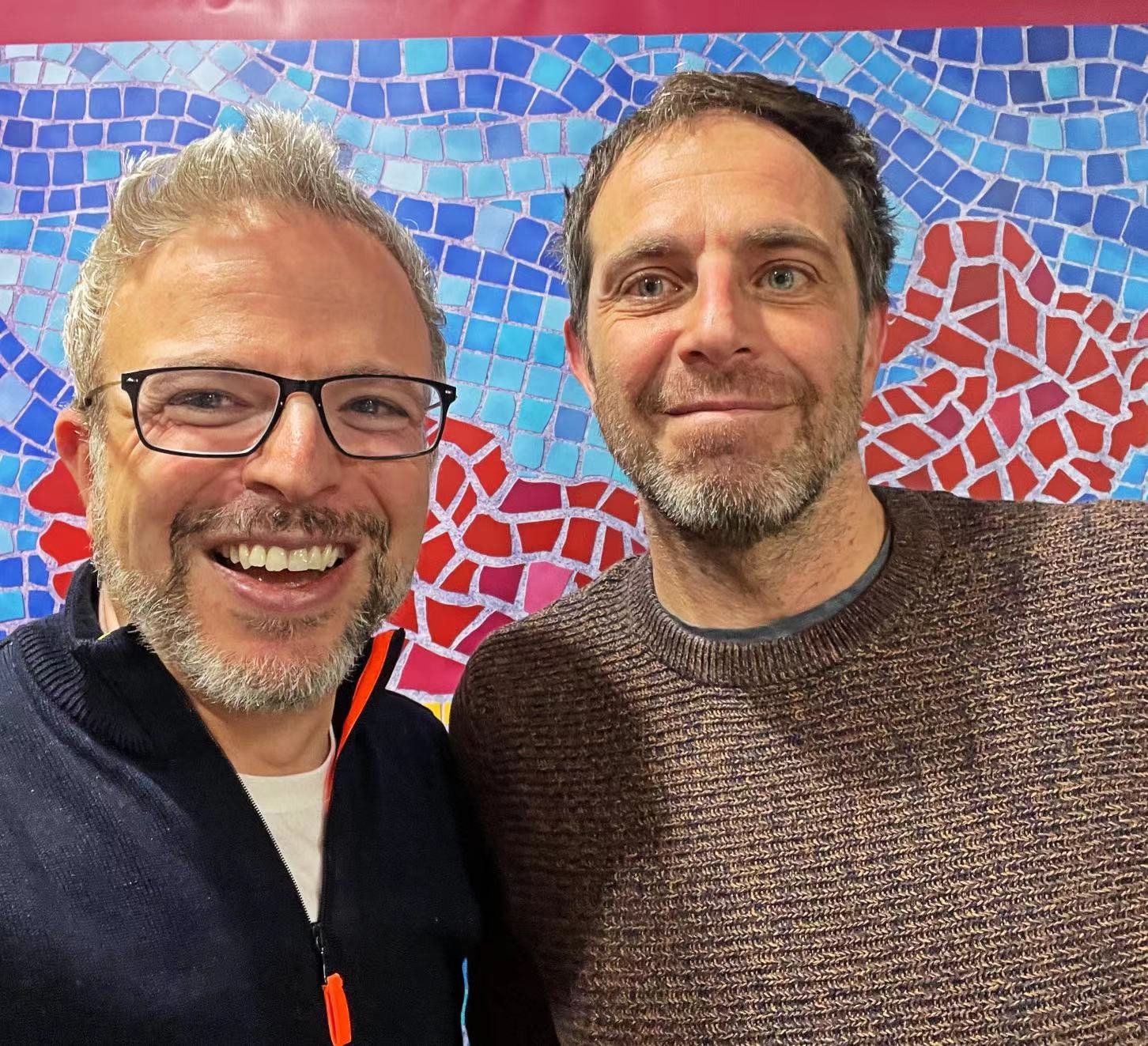
To Listen Here…
Click the ▷ button below:
To Listen/Subscribe Elsewhere…
1) Click the link to this episode on one of these well-known platforms:
2) Or on one of these China-based platforms:
To Read The Transcript…
[Trailer]
L: The trick… I mean it sounds obvious, but the trick is just: stay legal.
[Intro]
OF: Welcome to Mosaic of China, a podcast about people who are making their mark in China. I’m your host, Oscar Fuchs.
We as people are all connected. Emotionally, societally, globally, whichever way you look at it. It’s one of the key aspects to Mosaic of China, I want this project to be a weekly reminder of this kind of grand interconnectivity of people and things. So since we’re talking about being emotionally tied, why not have an episode about being emotionally tied?
The themes of today’s show are community, self-expression, and consent. As a society we’ve been talking more about the concept of consent in recent years. So I wanted to talk to a practitioner for whom consent is so important that getting it wrong might even lead to serious injury. There are certain letters of the alphabet that we skirt around, such as B, and then there’s D, and later you might find an S, and then how about M as well? So if you’re wondering at any point during today’s show “Wait, what are we talking about here?” or “Why didn’t you ask this question?” I probably did! It’s just in the full-length PREMIUM version of the episode, rather than this regular version. So if you want the full story, let me remind you right from the start to head to the Mosaic of China website for all the details on how to subscribe.
With that having been said, I’m going to give you a few seconds to decide whether you would prefer to skip this episode. OK, do I have your consent to continue? Good, then let’s proceed. And you can say ‘No’ and stop at any time.
[Part 1]
OF: Thank you so much for coming, Davide.
L: Thank you for inviting me.
OF: My pleasure. For the purpose of this conversation, I'm going to call you by the name which you're known for, which is Laodai.
L: Exactly.
OF: And can you explain what 老戴 [Lǎodài] means?
L: I have no idea, honestly. I googled it, it means like ‘wearing’.
OF: Like to put on glasses, to put on a scarf, it’s to wear…
L: Yeah, yeah, yeah. So basically, people in the community started calling me this, probably because of my name.
OF: Ah, because it sounds like your real name.
L: Right. ‘Dai-vide,’ something like that. And then I’ve stuck with it.
OF: Yeah.
L: It’s easy.
OF: It's common to be known as ‘老 [Lǎo]’-something-something, right?
L: Exactly.
OF: So it shows that you are in some way venerated. I'm glad that somebody gave you that name, and you didn't give it to yourself.
L: Oh yeah, I didn’t, I didn’t. And the character is very complicated, so I really cannot write it.
OF: Well if there's one 汉字 [hànzì] you should learn, I guess it should be that one. Come on.
L: Probably.
OF: Well, we are not yet giving away any clues as to what you do. But maybe the next question I ask will be a clue. Tell me, what object did you bring that in some way represents your life here in China?
L: I think it will be more than a hint.
OF: OK.
L: So I brought a seven-metre hemp rope. I want to be specific about the material, because it will be important.
OF: OK. I should ask, why should you be specific about the material?
L: Because basically - I think I’ll go straight to the point - I use it to tie up people. Because I'm rope artist. We can say ‘bondage artist’.
OF: Mm-hmm. So I'm guessing it's safer to say ‘rope artist’ than ‘bondage artist.’
L: It’s more accepted, let’s say this.
OF: Got it. Well I know that, because the reason I know you is because I went to the 40th birthday party of a mutual friend of ours - ciao, Alberto - and you were doing a show there, which you could call a ‘bondage show,’ a ‘rope show’. Why don't you talk through what I saw at that party.
L: That's what I do, basically. It’s 縛り [Shibari] Art, 縛り [Shibari] is the name from Japanese.
OF: 縛り [Shibari].
L: It’s very hard to explain if you haven’t seen it. It’s a mix between art and emotional connection and mutual trust, where there are two people playing around with ropes. Basically it’s me tying my model in an emotional way, and you can create a kind of performance.
OF: Right. Yes, that was what I experienced as an audience member. And not expecting it, I was quite shocked. Where to start? I mean, you did say that it needed to be hemp. Is that because that's comfortable on skin, is it?
L: Actually, because it's uncomfortable on skin.
OF: Oh.
L: Compared to cotton or other materials. But the main reason is, cotton is more elastic, it can stretch more. Hemp stays steel, and you can create that tension that really restricts people. The thing was born to be uncomfortable, it’s about the enjoyment to be restricted - to be submitted, we can say - and the enjoyment to submit and control somebody else. Consensually. So if it’s comfortable, it doesn't really make too much sense for me.
OF: Yeah, that's not the point.
L: Yes.
OF: You said that it was a Japanese art form. What was the name again?
L: 縛り [Shibari].
OF: What is that, then? Let's start at the basics. What is 縛り [Shibari]?
L: It's a very complicated question, because it’s a lots of things together.
OF: Yeah.
L: I can tell you what is my view of 縛り [Shibari]. So it's basically an erotic art form born in Japan, 縛り [Shibari] means ‘to tie' basically, in Japanese. But everybody who practices this art develops his own style and his own way to do it. So it's a very personal thing, and everybody has his own personal definition. If you want to hear mine…
OF: Yeah.
L: I focus more on the emotional side of the thing. Because I think you can only achieve the real beauty of the performance if you share deep emotion, and if you find a deep connection with the model. I started for the artistic side of it, because I'm an artist also. And I thought at the very beginning that it was only about the pattern of the ropes.
OF: Right.
L: I discovered, through the process and the years, that beauty - the beauty I was looking for - is achievable through the emotional connection.
OF: OK, so when you're talking about the rope side, we're talking about the beauty of knots? Is that what you mean?
L: That's a component. No, it’s the beauty of the whole final result. The knots, the pattern, the posture, the model’s expression. And also the feelings that come out from the performance. It’s more about a dance, and they need to dance with passion. And then you say “Oh, they're very good. I'm crying.” Or whatever.
OF: Right. And is it supposed to be, in that case, an artwork which is set on a stage and for others to see? Or is it something which was designed to be private?
L: I’m not sure, I believe it started as a private activity. And when you start to see the beauty of it, they probably started to shoot it. There are a lot of pictures. And then they started to make performances. I mean, there are a lot of dynamics, it’s not only about beauty, it's also about excitement and tension. So some people look for those elements, more than the beauty of the pattern.
OF: You’ve been doing this for how long now?
L: I think, six years now.
OF: So what was your story about how you found out about this?
L: Yes, the very very first impact was an art exhibition of 荒木 [Araki].
OF: 荒木 [Araki], that's an artist?
L: Yes, he’s a photographer of very erotic pictures, back in the 60s I guess.
OF: With ropes, or..?
L: With ropes, yes. I was really kind of obsessed about this. Like super super into it. And I tried to find out more about this art. Now you can find a lot, but before it was very very hard. They were very random. Some were not the real thing, it’s just more like a decorating pattern. So it was quite hard. But I started tying my leg, the basic knot.
OF: Oh you tied your own leg?
L: Yes. That's how everybody starts.
OF: Aha.
L: Because it’s practice, you need to get the muscle memory. Then I remember, I found in the street this kind of mannequin. And I started to tie my first body pattern on the mannequin. But that wasn't very effective, because it's very hard plastic. And it didn't have any arms or legs, it was just the chest.
OF: Oh wow, you are a serial killer.
L: No, no, it was a plastic mannequin. It’s useless basically to use a mannequin, because the feeling is completely different, and the tension you can put on a human body is very different. The rope gets tighter in a different way. So I was stuck. To improve more, I had to find a real person.
OF: Right.
L: And I found this girl who is actually still my Japanese business partner. And she was my first model, meeting her started the whole process. And I was very very lucky, it was like winning the lottery.
OF: So she actually could teach you, as a teacher almost.
L: No, no, she doesn’t know a single knot. She didn't at the time, now she knows a little. Because when you do 縛り [Shibari] there are two roles, a ‘rigger’ who ties, and a ‘model.’
OF: A ‘rigger’, OK.
L: Yeah. And the model is just being the model, so doesn't really care about the techniques.
OF: Yes.
L: But she taught me a lot in terms of dynamics, and connection, and how the model feels. At that stage in my mind was only an art practice, nothing more. And she's actually the one that opened to me the concept of the emotional tie, rather than the artistic tie.
OF: Got it. And so she could tell you "Yeah, this feels good”, “No, this is too tight”…
L: Yeah. More than physical sensations, she was telling me things like “I feel this is a little empty, I feel you're focusing more on the knot than me.” More, the connection side. And then I learned a lot because I realised “OK, I'm not tying for my pleasure, or for making something like a sculpture. I’m tying for communal pleasure. So I don't need to focus on the rope, I need to focus on her.” It's about how you tie, and how you touch, and how you give your feelings to the model. You can see a lot of shows, it's beautiful choreography but if there's no connection, it’s not beautiful emotions coming out.
OF: Yes, you said choreography. It makes me think almost like figure skating or like ballroom dancing, right? Where you see two people, and they're doing an art form. But there is a sensuality, and there is this communication between the two people that you could describe as being emotional. So I can sort of see it through that prism.
L: Yes. It is. The dynamics are very similar. I believe doing rope can boost your sexual life, but I also believe going dancing, tango, salsa night…
OF: Yes.
L: I believe it’s the same dynamic.
OF: Yes. You said before how this was a process where you were learning, and your model must have been very patient as you were going through this learning process. Were there any specific mistakes that you made at the beginning?
L: Mistakes, I think, are part of the learning process. As long as you’re learning basic stuff, you just do the wrong knot and then basically you redo it. In terms of when you're getting more confident - and you try more difficult and dangerous things like suspension - then mistakes usually cause injuries for the model. So it's better not to try things that you haven’t practiced a lot. But mistakes still happen. I’m very glad I’ve never been a rushed learner. In my career, I experienced just one injury. The most common injury in rope is nerve damage of the arms. So if you press a nerve a lot, you damage it, and you cannot use the nerve for a while.
OF: Like, a week or two, or..?
L: Yes. Like a dead hand for some days.
OF: And in that situation, what would have happened? That would have been you doing the wrong knot? Or a communication issue between you and the model?
L: I think the fault was between both of us. Because my fault was not being that focused, to notice something was wrong. And on the model’s side, she didn't let me know some problem was going on.
OF: I see. So she was in some discomfort, but didn't know that it was a problem.
L: Yes. That's why a model is a role, it’s not just a tool. So models have to learn about their body, and improve in that role of a model. So…
OF: Yes. They’re learning, just like you're learning.
L: Yes, yes. I mean, there is no real school of modelling, it’s more about practice.
OF: Yeah.
L: But it is. I can tell if I’m tying somebody that has been tied fifty times, compared to somebody tied five times. I can tell.
OF: Aha.
L: There is the risk awareness. Like everything has, like sports.
OF: Yes. Which then comes down to consent.
L: Yes.
OF: Because I'm guessing that at each point there is some kind of communication? Or do you just get all the consent at the beginning? How does that work?
L: Consent is the main thing. Because it's not only putting rope against the body, it’s about touching the body. And it’s about doing things like pulling hair, or grabbing the neck. You don't know people’s past, so you don't know if what you’re doing can trigger some traumas or something.
OF: Aha.
L: So when you tie somebody, you have to talk beforehand. Actually when you do every S/M practice, you have to talk and get consent. And when you ask somebody for consent, never ask “Is there something you don't like?” Because they cannot think of every possible option you can go through. So when you ask for consent, just state everything you would like to do, and get a yes or no.
OF: Can I tie this arm? Can I… what?
L: Can I whisper in your ear? Can I give you a soft kiss on the neck? Can I grab? Can I squeeze? I go through all these things. I mean I'm not that crazy, so I have the 10-15 things I like doing, so I cover all of those beforehand.
OF: Yeah.
L: Of course, you can talk to me if something is going wrong, or if there is some problem. And I also maybe slide the hand and see the reaction. If you see it’s uncomfortable, just stop. If it's like comfort and excitement, you can go to the next step.
OF: Yes. I mean, this is the thing about consent. People who… Let’s say “men” here, right? Men who think of this idea as "Oh, it's not sexy, when you're stopping what you're doing, and you're asking things, and making sure…” Like, I think it is sexy!
L: It is. What I do, I like domination and submission play. That also has to be very consensual. I mix the consensual questions with play questions. Like “I'm going to do this. I know you like it, don’t you?” Something like this. And you are free to say “No.” If they say “Please please, do it,” or if they say “No, sir”…
OF: Yes I get it. It's part of the play.
L: It’s like camouflaging the consent. The thing is, in my position - that I do this also, let's say professionally - it happens a lot that a complete stranger will ask me to get tied in public or privately. So my risk awareness is very high.
OF: Yeah so talk me through then, how would you do your art in that situation? Versus someone who, let's say, you've worked with for many years?
L: When I do sessions… Some people pay me to get tied.
OF: Yeah.
L: Those are called ‘sessions.’ I'm really clear at the beginning, I cover all those discussions. And I'm very safe. I don't do too much, even if I maybe want to.
OF: Yeah.
L: Also I do a little test, that they don't realise is a test. Because it's in my beginning routine, when I tie somebody. I usually sit behind them, and I push my fist against their chest, towards me. If they abandon themselves completely, I can understand they're more submissive. If they push against me, I can understand they're not very comfortable or they don't trust me.
OF: Ah.
L: So I change the flow of the rope, based on these little things.
OF: Yes.
L: And also I squeeze the rope very hard. That allows me to understand the level of pain they can take, and then I understand what I can do and what I cannot do.
OF: Yes, this is what comes from experience, right?
L: Yeah.
OF: If you are a new model, it might be good to try and find a more experienced rigger. Or is it actually nicer for inexperienced riggers and models to learn together?
L: It depends what you want to achieve. If you're a couple and you want to achieve connection, me tying her doesn't really make sense. It’s better that he learns.
OF: Right. Is that what you also do? You help couples to do this together?
L: Yes, but we need to also keep it legal.
OF: What do you mean by that?
L: Because there is this law in China, more than two people naked in one room is illegal.
OF: Oh, even in the privacy of your own home.
L: Yes, yes. Threesomes are illegal.
OF: Mmm-hmm. Noted!
L: Yes, yes.
OF: Well, you were saying about your main model. She was well connected with the scene in Japan. Why don't we talk then about China? We're here in China. You've been doing this now personally and professionally for a few years. So how did that happen for you here in China?
L: Every night in Japan, there's a performance or there is a saloon. There's a lot of legal activities, without breaking any law. And then I see the same activities are happening in the world. And then I question myself “Why is nothing happening in China?” And I know the answer actually, because it's more restrictive. But it’s about ‘setting the line’. And then when you set the line, you can do everything below that line.
OF: I see.
L: The line in China is lower than Japan, or lower than Europe. But it’s just about that. So I came back, and I started to inform myself about communities in China. I found a guy, and became friends with him. So I said “Let's try to do a party.” So basically the next month after that, we made the first public rope event in China. Me and this guy, 2017, at Roxie. And everybody was telling me “Why are you doing this? Nobody will come.” But we did it, and forty people came. And it was quite good, some easy suspension.
L: And then I started to do it every month. More and more people started to come. Every part of the community, like crossdressers, fetish, latex, canine.
OF: Oh.
L: Everything.
OF: Yes.
L: The trick… I mean it sounds obvious, but the trick is just: stay legal. We are teaching rope art. We set the line, and we don't go over that line. So no nudity, no real pain, no scars.
OF: Yeah.
L: And we built, basically, the public community from that. I'm still learning - you never stop learning - so I'm still going to Japan to meet masters. But it's very expensive. So then I got this other idea after a while. Rather than go there and pay for lessons, what if I invite masters to China?
OF: Yes. That's a win/win.
L: Yes. So I did that, thanks to my model who now became my business partner at this stage.
OF: Right.
L: Japanese trust Japanese. So we were able to invite very big names, and make the first ever workshop from Japanese people in China. Actually everybody who was interested in rope traveled from their city to my house.
OF: From all over China?
L: Kind of. From 天津 [Tiānjīn], 长沙 [Chángshā], 深圳 [Shēnzhèn]… Because it was a very unique opportunity.
OF: Yes.
L: Otherwise you have to go to Japan and pay much more. So they came to my workshop. And they started to spread the knowledge in their own cities. So more communities grew, and they started to - I will say ‘be inspired.’ I don't want to say ‘copy.’ - they started to be inspired by my activities, and they started to make public rope parties. They started inviting people from Japan, from Europe, to teach their workshops. And it was quite surprising, and they get some success before COVID. COVID stopped everything, mostly. Now - compared to just five years ago - it’s a completely different level of acceptance. If you look for it, every week in Shanghai, there is a workshop.
OF: Really?
L: There are different kinds, I'm not the only one. Different teachers who are teaching their way, some are more spiritual, some more traditional. Yoga studios started to have their own rope art schedule.
OF: You're kidding.
L: No no, it’s true, it’s true.
OF: Oh god.
L: Yoga studios are expanding to include some workshops.
OF: OK.
L: I mean, if you think about silk yoga, aerial yoga…
OF: Oh.
L: Technically it’s not that different.
OF: It's interesting. Yeah.
L: Technically.
OF: How, then, is your status in China now? Like, are you well known here?
L: Yeah, it’s also surprising. There are people - who don't even know my face - who come to my event. And somebody calls me ‘Laodai,’ and then suddenly everybody realises that’s me. And they start to come, asking for pictures or sharing WeChat. And actually now I'm going on tour.
OF: Really?
L: Yes, I go to 深圳 [Shēnzhèn], 长沙 [Chángshā], and 成都 [Chéngdū].
OF: To do these workshops, right?
L: Workshops, yes. And performances.
OF: Let me end this part of the conversation by going more into your personal story again. How has this affected you in terms of your own sexuality?
L: In my experience. I really tie a lot of different people, men and women. And I learn my reaction to different people. And I learn there is a ‘rope love’ that is different to romantic love with a partner. How I explain this usually is, you have to think about the different loves you experience. In English, you use one word. The love to your mother is different, but you still call it ‘love’. Love towards your friends is another kind of love. Towards your sexual partner or life partner is another kind of love. So there is also the rope love.
OF: How do you talk about that with your potential romantic partners?
L: I'm very honest, because it causes lots of troubles.
OF: Yes.
L: So basically when I meet somebody, it’s the third answer I give. Like, what's your name? Where you from? And what you do? I say it then.
OF: Yes. But then don't you scare people off very quickly, if you…
L: I do. I do.
OF: Yeah.
L: But it easier. Because if they found out after, it will be much harder to explain. And actually saying it honestly and kindly, it makes it sound more normal than what they probably imagine. They don't feel it’s something I want to keep hidden, or I am ashamed to tell.
OF: Yes. It is interesting. I mean, I don't know what the right answer would be. Because you immediately talk about your fetish - your kink - on the first date. On the third question, you say. I might then judge you as like “Ach, this is someone who doesn't have the right kind of boundaries, doesn't really know how to talk in a natural way.” Like, why should you bomb me with that information too soon? You know, because it could be a situation where I get to know you; I like you; and then on the fifth date you realise “Oh, this guy is into philosophy.”
L: Yeah.
OF: Or “This guy's into skateboarding.” It could be something a little less upfront, right?
L: It happened that I shock people and they judge very very hard. Honestly, I don't say it, I'm just answering questions. When they ask me “So what do you do for a living?” or "What else do you do?” to not say so would be lying.
OF: Yeah, because this is your full-time gig really, now.
L: Kind of, yes.
OF: This is it. It would be weird to not mention it.
L: Yes.
OF: Yes. So how do you define yourself now?
L: I'm actually in a stage where I'm not doing it for sexual reasons. So I can see a potential partner that doesn't like rope. Now I'm more about quality. If I think about my status of kink, I can define myself as a 'Care Dom’
OF: ‘Care Dom’?
L: Yes, it’s a thing. So basically ‘dom’ means the dominant part. But basically, I do that to serve the person I submit. So technically I take control, but to give them enjoyment. I like to give pleasure to people.
OF: Yeah. This is a nice way to end the conversation, I think. Because when people think about certain kinks and certain fetishes - and rope is one of them, but it could be leather, it could be rubber - like, they always have this scary image. You know, it's intimidating. I mean, you look at the ropes, and it is intimidating. But then talking to you, you do get the sensuality, you do get the ideas that we're talking about. It's about empathy, it’s about empowerment, it's about that connection between you and the other person, right?
L: It's true. Honestly I have to say, most of the best people I meet are in the kink community. They really care about respect and trust, and they don't have this social limit. So it's easier to find good people in the kink community than outside. Of course, there are still predatory people that do consent-breaking behaviour. But the majority are very nice people. I would more trust somebody dressed in latex than somebody dressed with a tie.
OF: Well said. And I'm glad you also mentioned the dangers too. I think everyone needs to be open-eyed about that.
L: Yes.
OF: It’s not a world of rainbows and marshmallows.
L: No, the first thing - the very first thing - is consent. There is a very nice video, about how consent is like a cup of tea.
OF: I've seen it.
L: Yeah.
OF: If I can post that somehow, I will, as part of this episode. Thanks so much, Laodai.
L: Thank you, thank you.
OF: We're going to move on to Part 2.
L: OK.
[Part 2]
OF: OK, now we move on to the 10 questions. Are you nervous about these?
L: No.
OF: OK. Question 1, which comes from Shanghai Daily: What is your favourite China-related fact?
L: I really like watching people dancing in the park.
OF: Oh right.
L: That’s cool. It's very genuine. Maybe you have a hard life, hard work. And then you just go dancing with other people, and enjoy. And then you go home. It’s a very nice activity. For years I believed there was some sort of competition, like the Olympics.
OF: Oh!
L: Yeah. They made a team and they compete in a challenge at the end of the year.
OF: There might be, I don't even know.
L: I don't know. I don't think so, I think it's only exercising.
OF: Nice. Next question, which comes from Rosetta Stone: Do you have a favourite word or phrase in Chinese?
L: It’s one of the first things I learned. I like 不客气 [bùkèqì].
OF: Oh, 不客气 [bùkèqì].
L: It’s ‘you're welcome’. Because in Italian, you say ‘boccuccia’ when you do, like, the kiss shape of the mouth. So 不客气 [bùkèqì] sticks in my mind.
OF: So it sounds like that.
L: Yes, ‘boccuccia’
OF: 不客气 [bùkèqì], boccuccia.
L: Yes.
OF: Classic. Question 3, which comes from naked Retreats: What’s your favourite destination within China?
L: I've travelled a little. I like places without too many people. So I was impressed by 张家界 [Zhāngjiājiè].
OF: 张家界 [Zhāngjiājiè].
L: 张家界 [Zhāngjiājiè], because it's very unique. It seems fake, like a movie set.
OF: Well, it's famously…
L: Avatar.
OF: Yeah.
L: They shot Avatar there for a reason. So that they could save money, rather than build a planet.
OF: OK, next question. If you left China, what would you miss the most, and what would you miss the least?
L: I think I will miss, if you have an idea, you can do it. And then it can be regulated afterwards.
OF: Yes.
L: This, I really like.
OF: That's exactly how it works, right? Because people think it's just the rules. But you can do quite a lot until you hit your head on the rules, right?
L: Yes, yes. I come from Italy, that is one of the worst countries in this regard.
OF: There’s a lot of red tape in Italy.
L: Yes. And the worst thing…
OF: The thing that you would miss the least, yes.
L: I don't want to be offensive, but I really hate when people chew very loud.
OF: Yes. Oh dear.
L: I usually don't judge anything, with people's behaviour. This, I know is a small thing. But it really annoys me. It’s automatic annoyance.
OF: I find it very hard. They can be on the other side of the restaurant.
L: Yes, yes. I really hate it.
OF: I think it's just impatient white men.
L: Maybe.
OF: Next question, is there anything that still surprises you about life in China?
L: No, I would say no. Oh actually it did. Actually I remember this right now. People have started walking with robot dogs. I’ve seen already four people doing it.
OF: Oh.
L: It’s a robot dog. And they’re walking the robot dog. So there's no sense in anything.
OF: Next question, which comes from SmartShanghai: Where is your favourite place to go out, to eat, or drink, or just hang out?
L: Mokkos. You know Mokkos?
OF: No.
L: Mokkos: M-O-K-K-OS. There are two, one is on the road and one is in a compound. I like the one in the compound. It’s a kind of Japanese concept bar. You can only order bottles, and then they save your bottle, and if you go five years later your bottle is still there with your name. And if you finish that bottle, they ask you if you want a new bottle or if you want to refill that bottle. And then you can keep the exactly same bottle for years. And every time you refill, they gave you a little badge. So there are these very ancient bottles full of badges, and you can see that people get drunk a lot.
OF: Yes.
L: I like this. And it's very quiet.
OF: Yes, you have these places in Japan a lot.
L: Yeah, yeah.
OF: And it's usually whiskey bars. I've never heard of that here yet.
L: Yes.
OF: Mokkos. OK, I'll check it out. But it sounds like you can't just go in there casually, you have to be like…
L: No, you can, you can, you can.
OF: OK. Thank you. You see, you can live in a place for eight years and still be learning new things like this. I presume it's been around for a while.
L: Me too.
OF: Yeah. Next question, what is the best or worst purchase you made in China?
L: The best purchase is this jar that purifies tap water.
OF: Ah.
L: That changed my life, because I was upset so many times when you finish your bottle of water and you're still thirsty, and you have to go out to buy water.
OF: You're saying it's a jar, so hang on…
L: It’s a jar with a filter. You just fill it with water, and it purifies it. The filter is inside.
OF: Yes. Got it. What is your favourite WeChat sticker?
L: I’m sending it to you.
OF: OK what's going on here? Can you describe this?
L: I don't know if there is a meaning, but I find it very fun. So there's Jesus, he tried to jump in the pool. And he cannot because… Jesus walks on water. And then there's this other guy from another famous painting who looks surprised, I guess.
OF: I love this. I've never seen it. I guess only an Italian would send this.
L: Maybe. It probably came from another Italian.
OF: Thank you. Next question, what is your go-to song to sing at KTV?
L: I'm quite upset with KTV in China because they don't have Italian songs.
OF: Not many, right? I've heard ‘Volare.’
L: Ah yes. That makes me more upset.
OF: Me too. I went out with some Italians one time, and we literally had to have that three times because…
L: No, no. I would never sing that, because it's stereotypical. So I sing very few songs. One is ‘Bohemian Rhapsody’, I go for it.
OF: Oh god.
L: Then I sing ‘Give a Little Bit’.
OF: ‘Give a Little Bit’, that one.
L: Yes, exactly. I basically sing two songs.
OF: There’s not even a third?
L: Maybe ‘Common People’ by Pulp.
OF: Oh, now that speaks to me. Are we the same age, how old are you?
L: 42.
OF: I'm 44, yeah.
L: Next week is my birthday.
OF: Ah, tanti auguri.
L: Grazie
OF: Yeah, that was my generation.
L: Yeah but you know, I’m not English. So I focus on reading too much. I don't focus on enjoying it.
OF: Oh.
L: In Italian, I can express more craziness.
OF: Well this is a problem with 'Common People’ because there are a lot of words.
L: Yeah. But that I know. I memorised that.
OF: And finally, what or who is your biggest source of inspiration in China?
L: I have a couple of friends that inspire me, and motivated me to get better. But some people give me inspiration not to be like them. Inverse inspiration. People who are happy with very material things. So when I see these people, I'm glad I took the path that I did.
OF: Even though it's more difficult.
L: Yes, yes. I quit my job, I’m struggling, but I'm more happy.
OF: I look forward to seeing how things progress in the future for you. Thank you so much for sharing your story.
L: Thank you for listening.
OF: Well, it was enlightening. And I hope that other people listening would have also experienced the same thing. Before you leave, out of everyone you know in China, who would you recommend that I interview in the next season of Mosaic of China?
L: So there's my friend Shreni. She's American, from India. And she's very spiritual, and she started a career helping people through breathwork.
OF: Breathwork. Breathing properly.
L: Yeah, yeah. It’s like, your emotions and your state are very influenced by your breathing.
OF: I understand that completely. I feel like I have a very shallow breathing pattern. So I'm looking forward to meeting Shreni.
L: Yes. She is the best.
OF: Well thank you so much Laodai.
L: Thank you. 谢谢 [Xièxiè].
OF: 谢谢 [Xièxiè].
[Outro]
OF: Well, I did it, I managed to finish off the massive editing job that was this episode. There’s an extra 20 minutes of Laodai’s story available on the PREMIUM version of the show, head to the website to subscribe. Even finding and editing clips for you to hear was a monumental effort this week, but here’s what I managed to include:
[Clip 1]
L: Then I said “Oh this thing could have lots of potential.” And then we broke up, for completely different reasons.
[Clip 2]
OF: It’s like “What, can no-one hear this? How can this be happening?”
[Clip 3]
L: If you stick with one master, he won’t allow you to learn a different style.
OF: Yes.
[Clip 4]
L: Going to that festival helped me to quit the job.
OF: Aha.
[Clip 5]
L: The Western view of it versus the Japanese reality.
OF: Trying to imbue more meaning onto something than actually there is, right?
L: Yes.
[Clip 6]
L: I found myself being like ‘under the power of the rope’. Losing control quite easily, and maybe doing things that can break a relationship.
[Clip 7]
L: It’s called 本結び [hon musubi]: ‘single column tie.’
OF: A ‘single column tie.’
L: Yes, because the arm or the leg is a ‘column’.
[Clip 8]
L: Genuine expressions. Can be pain, or can be struggle, or happiness.
[Clip 9]
L: A complete failure. They would say “What, are you crazy? Why did you ask me this?”
[Clip 10]
L: So like when you tie your shoes, you never think “Oh, I need to put this under this, and then make a loop, and then pull.”
[Clip 11]
OF: You don't want to shock someone, right?
L: This is the worst thing you can do, actually surprise somebody with something like that.
[Clip 12]
L: It can be very fluid. Actually it’s more women tying men in China.
[End of Audio Clips]
Thanks once again to Laodai for sharing his story with us. I’ve included a selection of photos on the website and on social media, so do a search for mosaicofchina or oscology on all the usual platforms - both in China and internationally - and you should find them there. For obvious reasons, we focused our conversation very much on the performance art side of his life. But when it comes to the lifestyle and the philosophy behind this esoteric art form - the ‘Davide’ behind the ‘Laodai’ - there’s something all of us can take away in terms of making us think about how we relate to - and communicate with - our most intimate partners. And making us think is what art’s all about after all, which is why I try to include artists of all description in the Mosaic of China. If you want to hear similar episodes that cover big ideas in the guise of performance art in China, then take a listen in particular to ‘Cocosanti’, the drag artist from Season 02 Episode 05; or Björn Dahlman, the professional clown from Season 02 Episode 17; or Zhang Yuan, the performance art curator from Season 02 Episode 07.
Mosaic of China is me, Oscar Fuchs, with artwork by Denny Newell. These days I always include at least one catch-up conversation from a previous episode after the closing music, and today is no exception, you will hear from the podcaster Yang Yi from Season 01 Episode 21. But you will notice that it’s quite short. That’s because when Yang Yi and I caught up, we spoke a lot about his experience appearing as a guest on This American Life earlier in the year. I didn’t want this story to compete with Laodai’s story, so I’ve taken that part out and made it into its own PREMIUM-only minisode. I’ll be releasing that on Friday, so there’s yet another reason that you really should be subscribed by now. And we’ll be back with another full episode from Season 03 next week.
[Catch-Up Interview]
OF: Hey Yang Yi.
YY: Hey Oscar.
OF: It's always a pleasure to see you. But out of every one from Season 01, which is now two seasons ago…
YY: Yes.
OF: …I think I have seen you probably the most.
YY: Oh, really?
OF: And there is an obvious reason for that, because I have been using your studio…
YY: Oh yeah.
OF: …To record Season 03.
YY: Yes, yes.
OF: And so I want to say officially, thank you so much for your help in getting me set up for Season 03. I lost access to my previous studio, and I was asking around, and then you just said one day “Hey, just use my studio”. And I was like “Perfect. I love you.”
YY: You’re welcome.
OF: Thank you man, I appreciate that very much. You, you have had many more changes since Season 01.
YY: Yes.
OF: We did a catch-up in Season 02, and at that point you had already quit your broadcasting job, and you had gone full-time into your podcasting career.
YY: Yes.
OF: You had 11 podcasts. So what is the situation with your company today?
YY: For original podcasts we now have twenty.
OF: Twenty.
YY: Yes. And with another twenty branded podcasts. We help companies to produce their own shows.
OF: Right.
YY: Yeah.
OF: So do you offer the editing support, the production support…
YY: Consulting support. Because they have no audio strategy. Maybe they were very familiar with Tiktok or social media, but they don't know audio. So the first thing is consulting. Audio is a very fresh thing. You know, in many people's minds, when they talk about audio, the first thing come to their minds is music. And then it's audiobooks. And then it’s education. So what is podcasting? For them, maybe this think “Oh, it's a personal radio station. Or an audio blog.” They don't have the sense of what it is. I need to tell them that a podcast is a show. And the show is not personal, it’s a show, just like you watch on television. It means well-educated tier, younger generation, the people who live in big cities, active in business, in consuming, something like that. So I need to, you know, draw a picture. And now it is not the mass-communication era. People exist in very small groups.
OF: Yeah.
YY: So you need to find your target audience…
OF: Yes.
YY: …And match them very efficiently.
OF: Well, that's always been my problem with Mosaic of China, because I can't focus in on one particular thing, that’s my problem.
YY: Ah.
OF: But it is a diverse place. And that makes me ask you then, so where do you see the trends in podcasting right now?
YY: OK, for original shows and branded podcasts, it’s very different. So for the branded podcasts, I would tell my clients the key word is ‘differentiate.’ You need to do something separate from other shows, and show the things you're really good at. Podcast listeners, they will think “Oh, you are an expert in this field.” They will trust you. And they will become your listeners, even if the didn't know this field before.
OF: And in terms of your shows then, why would it be different? You obviously need to differentiate your shows too, no?
YY: Yes, but for original shows, maybe we have 5-10 different topics or genres we could do. So we need to choose. So we need to research the marketing.
OF: Yes.
YY: We need to, you know, put the shows in that space.
OF: Well, I am sure next time we catch up, you will have more and more and more. Are you going to do an English language podcast at some point?
YY: Oh, yes. Maybe I will invite you to contribute some stories, something like that.
OF: Very good.
YY: Yes.
OF: I am sure, when you do it, it will be great. I'm sure it'll be better than mine as well, so… I wish you luck. Thank you so much for being part of this project. You were the co-organiser of the first PodFest, which was a conference where I met you and many other podcasting people in Shanghai.
YY: Yeah.
OF: And you've really been with me in my journey since that day. And I hope that we will continue to stay in touch.
YY: Yes, of course. Thank you.
